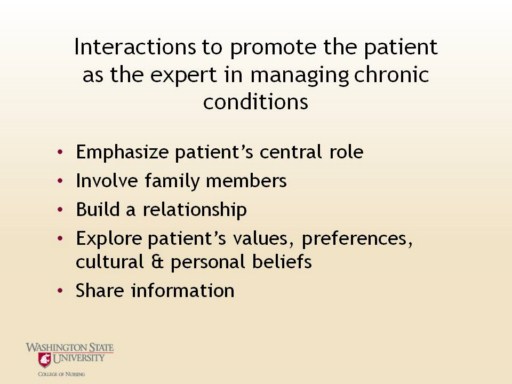| front |1 |2 |3 |4 |5 |6 |7 |8 |9 |10 |11 |12 |13 |14 |15 |16 |17 |18 |19 |20 |21 |22 |23 |review |
 |
The Institute for Health Improvement (2009) developed a tool kit, Partnering in Self-Management Support: A Toolkit for Clinicians, which is available online and contains an abundance of information and resources for clinicians to use to improve self-management support for their patients.
In the next few slides, we’ll review the key concepts they’ve identified as important to implement for self-management support. This slide and the next one provide tips for health care professionals to implement during every interaction with the patient and the family to promote the patient as the expert in managing his or her chronic condition.
They recommend:
•Describing
and promoting self management by emphasizing the patient’s central role
in managing his or her health.
•Including
family members in care if the patient agrees to doing so.
•Building
a relationship with each patient and family member.
•Exploring
each patient’s values, preferences and cultural and personal beliefs so
that those beliefs can be recognized and honored.
•Sharing
information and communicating in a way that meets the patient’s and
family’s needs and preferences.
Reference: Institute for Healthcare Improvement (2009). Patnering in Self-Management Support: A Toolkit for Clinicians. Available at: http://webcache.googleusercontent.com/search?q=cache:3K2554SIveYJ:www.improvingchroniccare.org /downloads/partnering_in_selfmanagement_support__a_toolkit_ for_clinicians.doc+IHI+Self-Management+support+toolkit&cd=3&hl=en&ct=clnk&gl=us |